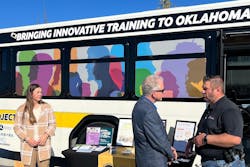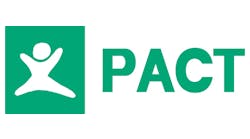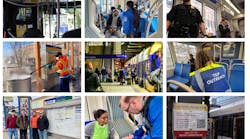January is National Human Trafficking Prevention Month and transit agencies are renewing their anti-trafficking policies and programs to better enable both their riders and employees to identify and respond to potential trafficking situations.
Human traffickers often times take advantage of public transit when transporting and recruiting their victims. The features designed to make transit a seamless mobility option for the public also provide lower cost and anonymity to traffickers.
In 2018, the Polaris Project, an organization working to combat and prevent sex and labor trafficking, issued a report that included a survey of 104 trafficking survivors. It was found that 42 percent of the victims interviewed were trafficked on or using public buses.
Part of transit agencies’ essential role in communities is in educating and combating this crime.
The North Carolina Department of Transportation (NCDOT), Rio Metro Regional Transit District (Rio Metro) in New Mexico and the Oklahoma Transit Association are each taking a stronger stance to prevent human trafficking in and around their communities to make the public transit space an anti- trafficker zone.
NCDOT
North Carolina was ranked ninth in the nation as a state being more susceptible to human trafficking according to a report released by the Polaris run National Human Trafficking Hotline. NCDOT’s transit agencies are working to strengthen their security and safety policies, with a focus on educating transit employees and operators throughout the state.
In 2020, NCDOT was awarded a $120,000 federal grant by the Federal Transit Administration (FTA) to develop and deliver training on human trafficking for public transit providers statewide in a collective initiative.
“We felt like we were the ones that could best reach out to each of our 98 different transit agencies to make sure that it’s something that is statewide, rather than accounted for by each individual agency,” said Brennon Fuqua, NCDOT interim director for the Integrated Mobility Division (IMD).
The agency has since progressed its training into a full ad campaign and web training course, tailored for transit employees. The training will be required for all North Carolina public transportation agencies and will help to educate NCDOT employees on how to recognize and respond if they suspect human trafficking in or around a transit space.
NCDOT IMD also created posters to be distributed across the state and issued a public service announcement used with the online training program. These materials educate public transit employees and riders about the common warning signs of human trafficking, how to report concerns and how to be an active bystander.
NCDOT believes the state’s transit professionals are the best option to train their colleagues on this sensitive topic.
“We really wanted to create a ’train the trainer’ environment, where we had our employees with NCDOT going out to each one of the agencies and hosting robust in-person training opportunities,” Fuqua said.
Fuqua noted allowing employees to teach one another helps to solidify the messaging within NCDOT’s system and establishes a consensus of practice. The peer-to-peer approach needed to be revised when the COVID-19 public health emergency was declared in the U.S. in March 2020.
“With COVID happening, we repurposed what the grant funds were going to be used for and created a virtual online training assessment required for each one of our transit operators,” Fuqua explained. “We also put together a central website that has information both about NCDOT and sex trafficking within our state or human trafficking within our state.”
The video training walks employees through the actual experiences of trafficking survivors and explains what could have been done to prevent the trafficking through public transit.
As part of the training, transit employees must answer questions and pass with an 80 percent at the end of the video.
NCDOT reports 150 participating transit employees and operators from agencies across the state have taken the quiz.
Fuqua said the agency expects to have a much larger participation rate moving forward.
Rio Metro
Rio Metro launched an anti-trafficking campaign in partnership with the Protect All Children from Trafficking (PACT) Project at the start of January 2024. The agency, along with Capital District Transportation Authority in New York, was selected to participate in this program with PACT.
The Transit Against Child Trafficking (TACT) campaign uses systemwide advertising and verbiage that focuses on noticing the signs of child sex-trafficking on public transit. TACT works to enable riders and employees to pay attention to an unaccompanied or distressed child and identify signs of a child in harm or danger. Other signs are avoiding eye contact, being easily startled or afraid, providing scripted responses and being yelled at or intimidated.
Some public transit users are accustomed to zoning out after taking their seat on a bus or a train. Rio Metro is trying to utilize the crucial five to 10 minutes before riders disengage to activate their minds with educational advertisement that details the signs of child sex-trafficking with programs made in part by the PACT program.
Posters on buses and trains, digital screens with written prompts and social media posts discussing the experiences of trafficking survivors help to reach riders of all ages.
Two years prior to the TACT campaign, Rio Metro launched its evergreen anti-trafficking program, Busing on the Lookout, as a part of the operators’ onboarding training. Operators must renew their anti-trafficking training every two years, keeping their training up to date.
Allyne Clarke, Rio Metro marketing director, brought PACT and the agency together. She had been inspired by other agencies’ anti-trafficking programs and felt Rio Metro and its riders would benefit from this type of a campaign.
“I felt that there was a need in this market for a program like this because we are the only railway system in the state,” Clarke said.
The PACT program ensured Rio Metro had the graphics, educational videos, talking points and resources in both English and Spanish to launch its TACT campaign systemwide.
Oklahoma Transit Association’s Roling Classroom
In Oklahoma, human-trafficking is a major issue statewide according to Andrea Ball, the Oklahoma Transit Association’s executive director.
“Oklahoma has a lot of agriculture and you don't think of agriculture as a place where people would be trafficked,” said Ball. “The reality is migrant labor is absolutely a front floor for trafficking.”
The agency is working to educate its transit community by bringing training right to their doorstep.
The Rolling Oklahoma Classroom (ROC) is a safety and security education space on wheels, offering training designed to enhance awareness of public transit options in rural, tribal and urban communities.
The project utilizes an Oklahoma City Embark transit bus donated and retrofitted with digital screens and hands on practice lesson spaces that replicate possible situations that might occur on a transit bus.
The ROC provides the required training for operators in all aspects of bus management, security and customer service. Ball said that the program proved to be more cost-effective than taking all drivers to a location and spending money on a couple days of training out of the office.
A team of three with the inclusion of volunteers manages the bus, which, most of the time, requires them to drive the bus to agencies all over Oklahoma.
Andrea Ball, Oklahoma Transit Association’s executive director, is one of those people.
The ultimate benefit of this program goes to the rider's safety. Ball believes that it is a part of a bus operator’s duty to learn the warning signs of a person who is in trouble.
“Any transit worker that is educated and has their passengers' best interest at heart is certainly benefiting from anything that we're able to provide,” Ball said.
The ROC works to create a safe and comfortable environment for all riders. The program explores modules of wheelchair securement practice, conflict management and rider safety awareness in case of a possible trafficking situation. Participants practice with each other, helping to create an understanding with the operators of what a transit rider could be feeling in a situation.
The ROC bus has been made available to all public community organizations to prioritize safety and security everywhere.
Funding for the program came from an FTA grant in 2019 but the official launch of the ROC came in 2022 because of complications from the pandemic.
Ball noted that this type of a program has a “a ripple effect” with the potential to spread awareness on the human trafficking issue as a whole, beyond the public transit space.






